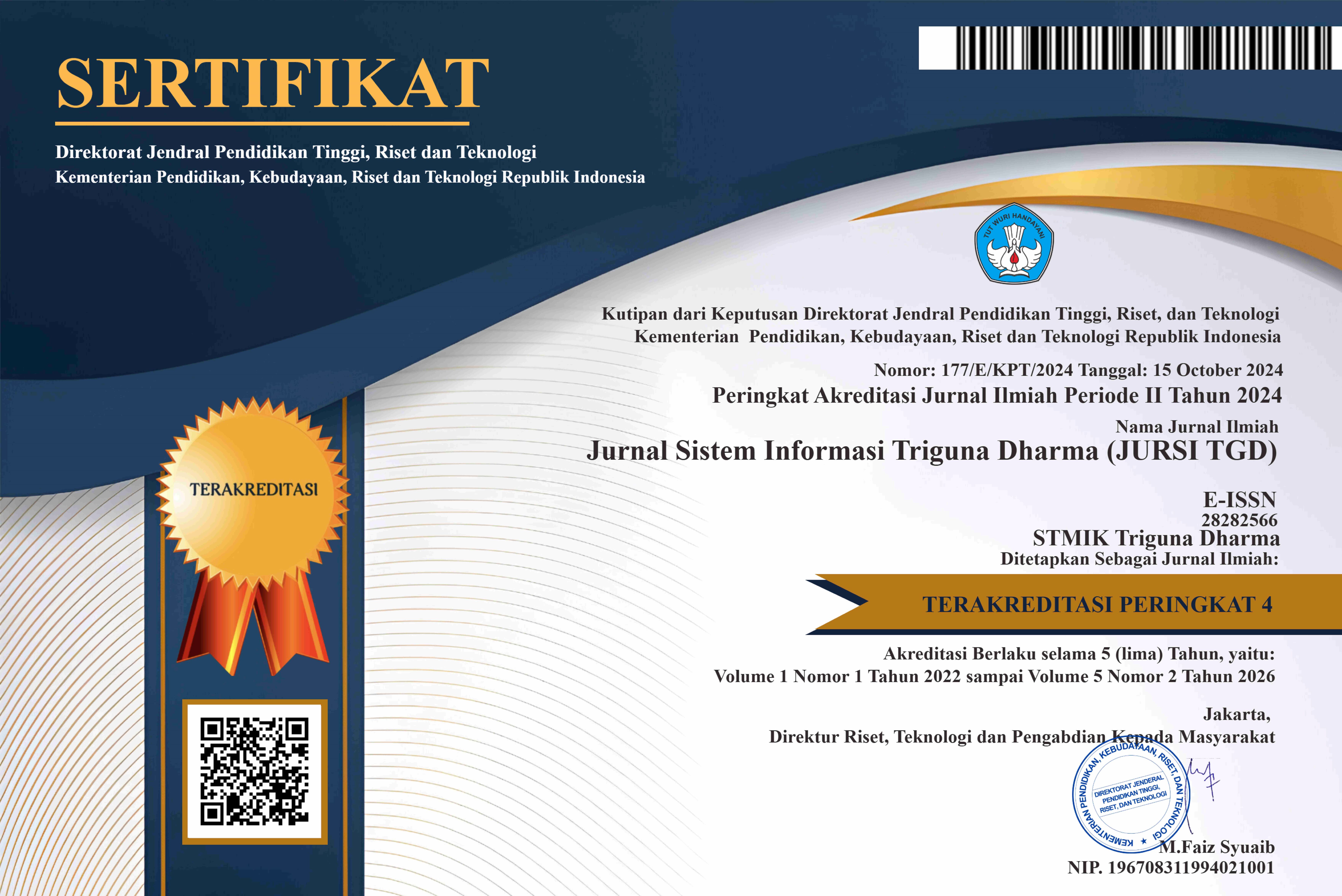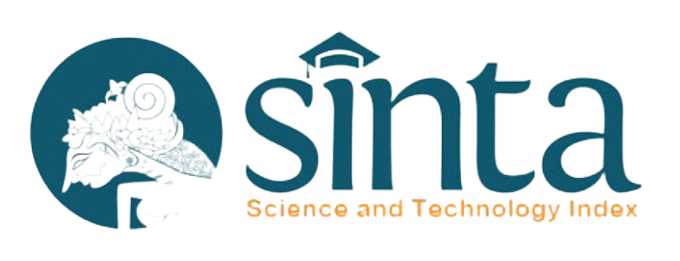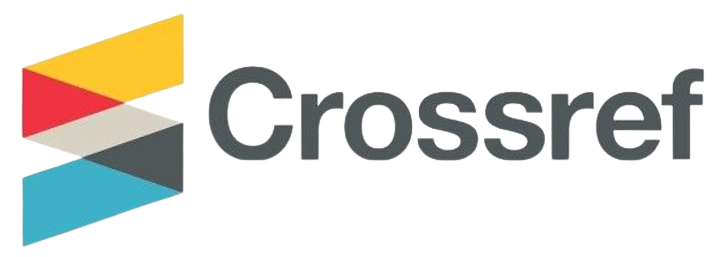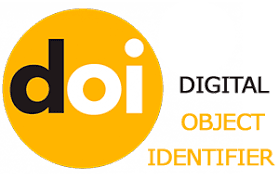Peningkatan Pelayanan Tempat Wisata Dengan Penentuan Rute Terpendek
DOI:
https://doi.org/10.53513/jursi.v4i4.11447Keywords:
Algoritma, Greedy,, Jarak,, Pencarian, Rute, TerpendekAbstract
Perkembangan teknologi membuat setiap informasi dapat tersebar dalam waktu singkat. Teknologi juga dapat digunakan untuk mengiklankan setiap tempat, usaha, produk. Perkembangan teknologi tidak lepas dari setiap kegiatan yang di lakukan oleh manusia salah satunya adalah penentuan objek wisata yang terdekat. wisata adalah tempat untuk repsing dan dapat bekunjung sampai waktu yang di inginkan oleh pengunjung, Sesuai dengan penjelasan diatas maka dapat dikatakan bahwa destinasi merupakan tempat yang dapat dikunjungin oleh wisatawan luar dan dalam negeri. Pencarian rute terpendek adalah kendala yang sering dihadapai oleh setiap pencari jalan alternatif untuk mencapai tujuan lebih cepat. Ada beberapa metode lain yang dapat menyelesaikan permasalah pencarian rute salah satu metode yang dapat menyelesaikan masalah tersebut adalah menggunakan metode pencarian heuristik. Salah satunya adalah algoritma Greedy Best-first search. hasil dari Penelitian dapat memberikan dampat positif kepada setia pengunjung terlebih dalam menentukan rute terpendek menuju tempat lokasi Wisatawan.
References
A. Decrop, A. Correia, A. Fyall, and M. Kozak, Sustainable and Collaborative Tourism in a Digital World. Goodfellow Publishers, 2021. doi: 10.23912/9781911635765-4477.
F. Fatimah, S. H. Al Ikhsan, and B. Wulandari, “IMPLEMENTATION OF THE HAVERSINE METHOD FOR THE APPLICATION OF FINDING TOURIST ATTRACTIONS IN NANGGUNG DISTRICT,” J. Pilar Nusa Mandiri, vol. 18, no. 1, pp. 59–64, Mar. 2022, doi: 10.33480/pilar.v18i1.3000.
A. Essien and G. Chukwukelu, “Deep learning in hospitality and tourism: a research framework agenda for future research,” Int. J. Contemp. Hosp. Manag., vol. 34, no. 12, pp. 4480–4515, Nov. 2022, doi: 10.1108/IJCHM-09-2021-1176.
X. Liang and L. M. Furkan, “The Influence of Social Media in Tourism Marketing Strategy: Side by Side Research in China and Indonesia,” Asian J. Appl. Bus. Manag., vol. 4, no. 1, pp. 369–380, Feb. 2025, doi: 10.55927/ajabm.v4i1.87.
L. Chen and Y. Zhang, “Digital Marketing Strategies for Tourism Promotion on Social Media Platforms,” J. Tour. Res., vol. 15, no. 2, pp. 45–57, 2023.
S. K. Deb and N. Mallik, “Effects of Social Media in Tourism Marketing: Outlook on User Generated Content,” J. Digit. Mark. Commun., vol. 3, no. 2, pp. 49–65, Nov. 2023, doi: 10.53623/jdmc.v3i2.316.
F. Şeker, G. Kadirhan, and A. Erdem, “The factors affecting tourism mobile apps usage,” Tour. Manag. Stud., vol. 19, no. 1, pp. 7–14, Jan. 2023, doi: 10.18089/tms.2023.190101.
A. Veseli, L. Bytyqi, P. Hasanaj, and A. Bajraktari, “The Impact of Digital Marketing on Promotion and Sustainable Tourism Development,” Tour. Hosp., vol. 6, no. 2, p. 56, Mar. 2025, doi: 10.3390/tourhosp6020056.
S. Elda Hiererra, Meyliana, A. Ramadhan, and F. Purnomo, “Smart Tourism Destinations Research Trend: A Systematic Literature Review,” in 2022 International Conference on ICT for Smart Society (ICISS), Aug. 2022, pp. 1–11. doi: 10.1109/ICISS55894.2022.9915164.
Z.-A. Torabi, M. Pourtaheri, C. M. Hall, A. Sharifi, and F. Javidi, “Smart Tourism Technologies, Revisit Intention, and Word-of-Mouth in Emerging and Smart Rural Destinations,” Sustainability, vol. 15, no. 14, p. 10911, Jul. 2023, doi: 10.3390/su151410911.
H. Wang and J. Yan, “Effects of social media tourism information quality on destination travel intention: Mediation effect of self-congruity and trust,” Front. Psychol., vol. 13, Dec. 2022, doi: 10.3389/fpsyg.2022.1049149.
S. Seyfi et al., “How does digital media engagement influence sustainability-driven political consumerism among Gen Z tourists ? How does digital media engagement influence sustainability-,” J. Sustain. Tour., pp. 1–19, 2022, doi: 10.1080/09669582.2022.2112588.
Z. Karim, “THE IMPACT OF SOCIAL MEDIA ON TOURISM INDUSTRY GROWTH IN BANGLADESH,” Int. J. Econ. Commer. Manag., vol. VI, no. 8, pp. 463–482, 2018, [Online]. Available: http://ijecm.co.uk/wp-content/uploads/2018/08/6831.pdf
Z. M. Alzaydi and M. H. Elsharnouby, “Using social media marketing to pro-tourism behaviours: the mediating role of destination attractiveness and attitude towards the positive impacts of tourism,” Futur. Bus. J., vol. 9, no. 1, p. 42, Sep. 2023, doi: 10.1186/s43093-023-00220-5.
Downloads
Published
Issue
Section
License
Copyright (c) 2025 Jurnal Sistem Informasi Triguna Dharma (JURSI TGD)

This work is licensed under a Creative Commons Attribution 4.0 International License.




















